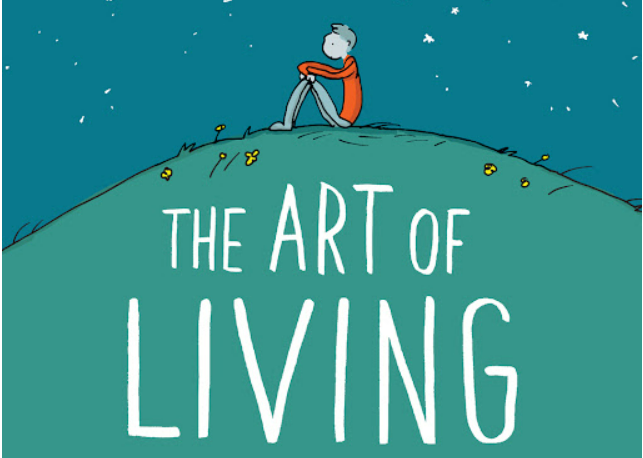Overanalyzing the Overexamined Life - Pausing for Grant Snider's The Art of Living
As impressed as I am about the way Snider manages to refine certain elements of his cartooning while maintaining his core minimalism, it’s the philosophy at the center of the book that requires examination.

I’m not sure I’d be able to pinpoint exactly when I first came across Grant Snider. I’m sure I read his stuff in an incidental (no pun intended) manner for years before I ever really explored his work on large. However, I remember the exact feeling when I first read a Grant Snider collection, 2019’s fabulous I Will Judge You by Your Bookshelf. I read the entire collection in one night divided into two different sittings. I’m fairly certain I annoyed my wife by audibly giggling on almost every page and occasionally thrusting the book in her face to make her read a particularly funny strip. Snider’s latest, The Art of Living, has been sitting on an end table for a few months now, a casualty of a hyper-busy school year. It’s somewhat appropriate, though, that I’d be able to pick up a collection, one that is fundamentally a collection of mindfulness platitudes, as my summer begins. I was wholly predisposed to like I will Judge You by Your Bookshelf. It was rife with English major-friendly humor coupled with the appropriate amount of self-deprecation. Would The Art of Living resonate the same way for me? I am a very reflective person (maybe I’m just neurotic), but I’m certainly not predisposed to mindfulness, some end result of a blue-collar Irish Catholic guilt-ridden upbringing. The overarching theme of The Art of Living is to take a moment. I’m not sure I’ve ever been able to do that. Could I take a moment to enjoy this book? Isn’t that just taking a moment itself?
Before I get into the content of the collection, I think it’s important to assess what Snider does, and has been able to do as a cartoonist during his entire career. I’ve always been of the camp that is more impressed with a tight short story than a sprawling novel, and I feel that there is an appropriate application of a similar philosophy towards comic strips vs. their larger cousins. Perhaps this is predilection. Despite my writing style, I tend to always find things too long - novellas are the ideal form, movies can usually excise their second acts, Minutemen are the truest punk band - you get the idea. Thus, despite the fact that I’m currently reading all of the Palomar Love and Rockets stories in succession, I’ve always been most impressed, and most at home with something like a single issue of Optic Nerve or Tom Taylor and Otto Schmidt’s Batman Annual # 3.
I say all of this because what Snider does on a page, sometimes two, is distill certain truths about the way we live in a manner that is very poignant and precise. The Art of Living is very much a meditation on meditation, and it’s kind of stunning to imagine the level of self-editing or restraint that’s necessary to lay out this type of strip. Yes, this is a collection of strips, and it isn’t as if Snider were sitting at a drafting table attempting to create one singular work. These strips all had a single purpose in and of themselves, and many were published long prior to the collection. Nonetheless, the ability to confront these types of existential crises in this beautifully sparse, poetic style impresses.
Stylistically, Snider pushes himself in a few different directions than he pursued on I Will Judge You by Your Bookshelf. His cartooning is still deliberately minimalistic, but he brings some new coloring approaches that add depth to his typically purposeful two-dimensional feel. Using watercolor techniques to enhance his natural images is a wonderful little touch that I might have missed if I weren’t reading an entire collection of these strips.
It’s hard not to see Snider in the vein of Tom Gauld. Both make a type of academic comic that winks at academia while incorporating an intentional style that allows the art to fade behind the ideas a little more than the average comic permits. I can’t help but wonder if Snider is conscious of this idea because The Art of Living tips the scale back a little more towards the art driving the ideas. Snider’s art picks up some abstract formalism traits, and parts of The Art of Living feel influenced by the later parts of Clyde Fans as he channels the style Seth employed as Simon Matchcard catalogs his mother’s items to meditate on the changing of the seasons.
But as beautiful as the art is, and as impressed as I am about the way Snider manages to refine certain elements of his cartooning while maintaining his core minimalism, it’s the philosophy at the center of the book that requires examination. And I’ll admit, I had a tough time with it upon the first read.
Admittedly, my love of I Will Judge Your By Your Bookshelf stems from the book’s content. Yes, the fact that I love wry self-deprecation about things I enjoy is a plus for sure, but the fact that the book is about something I enjoy on the face is more than enough of a vehicle in for me. And Snider certainly handled it well, creating a set of strips that both celebrate and boop the nose of a reading as a culture.
I was remarking to a friend that The Art of Living seemed well put together and that I appreciated what Snider was doing . . . but . . .
But, I kinda hate mindfulness.
So I thought about it - what makes mindfulness a turn off for me?
Initially, I chose to discard the most obvious premise, that it has been an en vogue phrase and, as such, overused and watered down for about a decade now. I chose to sidestep this premise because I think such an adverse reaction is a little passe and, really, too easy.
I narrowed it down to an overarching gripe, and to be fair, it is rather superficial and can’t exactly be applied with any degree of universality. First, mindfulness as it has been branded and marketed seems to me to reek of privilege. It appears to be the province of the rich. And, like most things birthed from social media, there is a level of artificiality and dishonesty that feels like hucksterism. There is certainly a disconnect between the influencers hawking a particular lifestyle and the type of people who think that said lifestyle is at all possible without a full-time job devoted to hawking the aforementioned lifestyle. That mindfulness is an industry is rather self-contradictory.
And, as a result, mindfulness seems not to jibe with my worldview. I had a blue-collar upbringing; work ethic was the primary source of pride. The notion of slowing down flies in the face of the nose-to-the-grindstone code I had instilled in me at a young age. There is no working-class connotation for mindfulness. Along with “self-care,” it seems to be a corporate buzzword reserved for managers and executives, not the callused hands of working people.

These complaints felt unfair or inaccurate when applied to Snider and The Art of Living. Yes, I think mindfulness reeks of privilege. I’m truly tired of hearing the term “self-care,” less because it seems contradictory and more because it feels both hollow and disingenuous. I don’t think there is anything about The Art of Living that feels disingenuous. And. honestly, I practice self-care all the time. Self-care for me is writing an essay like this or reading a book. And despite not being a very meditative person, I’m certainly contemplative. I studied English and Philosophy. Whatever work ethic was instilled in me did not cancel out my ability to pick the two most leisurely courses of study, obviously. Why would I be bitter towards a book telling people to slow down and think?
And then I happened to walk past The Art of Living, sitting slightly askew on the coffee table in our living room, and I noticed for the first time the full title of the book - The Art of Living: Reflections on Mindfulness and the Overexamined Life. I thought about that portion: the overexamined life. Of course, that made me consider the partially examined life, both the aphorism and the podcast. And so I paged through the book again and realized what I had missed the first few times I tried to read it.
Reading it is precisely the mistake I was making.
Now, I don’t mean that we wouldn’t want to “read” this book, but I don’t think that Snider’s prerogative here is to have anyone sit down and read this book back to front. And despite the fact I did just that for I Will Judge You By Your Bookshelf, I’m certain Snider did not have that goal in mind when he completed that collection either. Reading The Art of Living from back to front is probably exhausting for anyone, even someone without my bitter predispositions. Because it is a book of aphorisms, because it is precisely designed to cause the reader to break with the moment, the idea of reading it for the purpose of completing it contradicts the whole notion of the book. And while I’m of the opinion that once the words are on the paper, the author has very little agency over how one reads a book, I do think there is always something to be said for attempting to read a book on the author’s own terms. The meaning one may derive could differ based on what we bring to a book, but the process can align with authorial intent and still be personal to the reader.
Grant Snider’s comics appear on both his blog and in various periodicals. He is an incredibly talented producer of strips because he is able to distill complex concepts into a few panels with a poetic flair that naturally lands in the heart of the reader. Taken as a whole, The Art of Living was too much for me. But, as I realized I needed to stop over-examining things - I did tell you I studied English and philosophy, and overanalyzing is pretty much my primary skill set - I realized that I was missing the point of the collection as a whole. The simple fact that the book is a collection does not mean I need to read it all at once, digest it, and offer commentary. This is a book designed to be taken in doses. It is supposed to cause a shift in perspective, even for someone like me who has a hard time unplugging in that way.





Comments ()